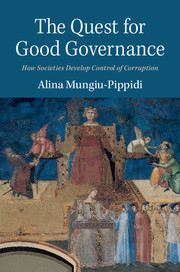Book contents
- Frontmatter
- Colophon
- Contents
- List of figures
- List of tables
- List of abbreviations
- Acknowledgments
- 1 Understanding control of corruption
- 2 Diagnosis and measurement
- 3 The road to Denmark: historical paths to corruption control
- 4 Structure and agency: determining control of corruption
- 5 Understanding contemporary achievers
- 6 Domestic collective action capacity
- 7 International agency and its anticorruption impact
- 8 From critical mess to critical mass: some tentative policy conclusions
- Appendix 1 Explaining bribery
- Appendix 2 List of variables and sources
- Appendix 3 Brief description of databases and surveys used
- Appendix 4 Impact of anticorruption interventions on control of corruption: bivariate regressions
- Appendix 5 HDI differentials from Figure 4.1
- Appendix 6 Classification of countries by governance orders
- References
- Index
6 - Domestic collective action capacity
Published online by Cambridge University Press: 05 September 2015
- Frontmatter
- Colophon
- Contents
- List of figures
- List of tables
- List of abbreviations
- Acknowledgments
- 1 Understanding control of corruption
- 2 Diagnosis and measurement
- 3 The road to Denmark: historical paths to corruption control
- 4 Structure and agency: determining control of corruption
- 5 Understanding contemporary achievers
- 6 Domestic collective action capacity
- 7 International agency and its anticorruption impact
- 8 From critical mess to critical mass: some tentative policy conclusions
- Appendix 1 Explaining bribery
- Appendix 2 List of variables and sources
- Appendix 3 Brief description of databases and surveys used
- Appendix 4 Impact of anticorruption interventions on control of corruption: bivariate regressions
- Appendix 5 HDI differentials from Figure 4.1
- Appendix 6 Classification of countries by governance orders
- References
- Index
Summary
What are normative constraints?
In Chapter 4 we found evidence that a society can constrain those who have better opportunities to spoil public resources if free media, civil society, and critical citizens are strong enough.1 We also found that elections in and of themselves do not offer sufficient empowerment, even in the absence of political violence. In competitive particularistic regimes (see Chapter 2), ethical universalism fails to take hold as the main rule of the game despite the presence of political pluralism and contested elections, and winners of the political process, in their turn, treat the state as the major source of spoils, feeding off the public resources they divert toward their clients. In many electoral democracies this type of governance context has developed and stabilized, and citizens of those societies seem uninterested or unable to change this state of affairs. Indeed, many of them contribute to it.
Where do normative constraints come from? In his book Development as Freedom, Amartya Sen (1999) famously argued that individuals, in order to achieve their potential, must be free from one-sided social domination and must combine their resources to pursue their collective interests and provide public goods to the many. It has never been obvious, however, that the end goal of freedom is to distribute public resources equally and fairly to everyone. In other words, liberty does not necessarily result in a governance regime based on ethical universalism. Elites, clans, tribes, political parties, and groups of every denomination may in fact use their freedom to advance their own narrow interests rather than those of society at large. Indeed, in the 100-plus countries that currently hold regular elections yet lag behind in controlling corruption, pluralism has delivered particularism rather than ethical universalism. The reason seems to be the absence at the grass-roots level of an active and enlightened citizenry able to build normative constraints for elite predatory behavior; instead we find dependent clients or disempowered individuals.
The literature on good governance frequently addresses normative constraints on corruption by discussing such concepts as “civil society,” “moral values,” “the media,” and sometimes “culture.”
- Type
- Chapter
- Information
- The Quest for Good GovernanceHow Societies Develop Control of Corruption, pp. 161 - 185Publisher: Cambridge University PressPrint publication year: 2015



